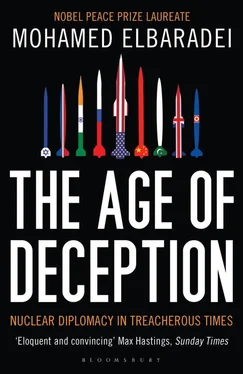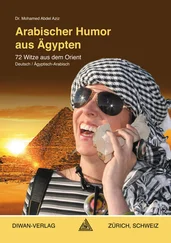This was the background for the September Board meeting. A few days ahead of the meeting, Bernard Kouchner took a shot at me, telling journalists that I had documents in my possession, “annexes” to the Iran report showing Tehran was working to develop nuclear weapons. [11] “France Accuses UN Watchdog of Hiding Iran Nuclear Evidence,” Agence France-Presse, September 3, 2009.
He was referring, of course, to the IAEA internal analysis.
My opening speech to the Board addressed the issue head on. These dismaying accusations made by Member States and fed to the media were baseless and politically motivated. I was clear that “All information made available to the Agency relevant to Iran’s nuclear programme which has been critically assessed by the Agency in accordance with its standard practices has been brought to the attention of the Board.” In effect, I said, the allegations were attempts to influence the Secretariat and undermine its objectivity and independence.
The French tried to have the last word, asserting that some information had been presented by the Agency in a technical briefing that was not reflected in the report.
I threw down a direct challenge: “Here are the people who supplied the information available to us,” I declared. “If any of you have any information that we have not shared with the Board, please step up right now, or forever hold your peace.” No one responded.
I could not understand for the life of me, I said, how any information that might have been presented at a technical briefing with 150 Member States present could be regarded as “withheld.” I then focused on our limitations in authenticating the alleged weaponization studies. If all the documents provided to us were authentic, I said, choosing my words carefully, then there was a high probability that Iran had engaged in nuclear weaponization studies. “But I have to underline this if three times,” I stressed, “and that is why we are stuck.”
It was something of a relief that, the day after this unpleasant confrontation, the Board conferred on me the title of Director General Emeritus. The tone shifted entirely, and for me this was a deeply moving experience. There were tributes from forty-one speakers in all. Together they represented the entire membership of the Agency. I will always remember two tributes in particular: “We are here to honor honor,” the Cuban ambassador said, quoting the poet Alphonse de Lamartine; while the Brazilian ambassador said I had “used the power of argument, and not the argument of power.”
Stories about the IAEA’s “secret annex” of information did not entirely disappear. A September Associated Press article referred to copies of this supposedly secret analysis. [12] George Jahn, “Nuke Agency Says Iran Can Make a Bomb,” Associated Press, September 17, 2009.
And in October, the U.S.-based Institute for Science and International Security (ISIS) published a paper on its Web site that included short excerpts from the document. [13] “Excerpts from Internal IAEA Document on Alleged Iranian Nuclear Weaponization,” ISIS, October 2, 2009. Retrieved at www.isis-online.org/uploads/isis-reports/documents/IAEA_info_3October2009.pdf .
Clearly either the document had leaked—and there were only six people within the Department of Safeguards who had access to it—or it had been obtained via someone hacking the Agency’s computers.
More important, however, was that a chance for a dramatic breakthrough with Iran had been unfolding behind the scenes.
It had started a few months back, with a request from Tehran for IAEA support in getting a new fuel core for its research reactor, which was used to produce radioisotopes for medical purposes. The enrichment level needed for the reactor was 20 percent, significantly higher than the 4–5 percent enrichment needed for power reactors and higher than the level Iran had set for itself at Natanz. The old fuel core had been imported, but Iran was now under sanctions, so the request was a hot potato: while it was perfectly legal for the Agency to support a Member State in getting fuel for a facility under safeguards, Iran was currently in violation of Security Council resolutions.
To test the water, I decided to have Vilmos Cserveny share Iran’s request with only two countries at first: Russia and the United States, using their representatives in Vienna. I asked Vilmos to explain the delicacy of the situation. If Iran were denied a fuel core from abroad, it would have every justification to proceed with higher-level enrichment at home to satisfy its own fuel needs. Finding a way to help Iran secure nuclear fuel for this legitimate use could send a positive signal.
A proposal put together by the United States and Russia was brought to the IAEA in early September. The proposal supported Iran’s request, but with a twist: Tehran would receive a research reactor core that would run on fuel converted from Iran’s newly accumulated stockpile of low-enriched uranium. The LEU would be sent abroad, converted into fuel in Russia and France, and then returned to Iran in the desired form of a research reactor core. The United States would provide political and financial support.
It was ingenious. After all that had passed, an opening had been found for the United States to elegantly reengage with Iran. By removing most of the accumulated LEU from Iran, tension over Iran’s uranium enrichment would be defused, or at least postponed. Iran would be demonstrating that its enrichment program was being applied to peaceful purposes. The international community would receive reassurance that Iran’s LEU stockpile was not being reserved for or channeled toward nuclear weapons. Diplomacy would at last get its foot in the door.
Then, on September 12, 2009, I received a call from President Obama. He began by graciously saying that he admired my work and believed we shared a vision on many issues. He wanted personally to invite me to speak at the UN Security Council Summit on Nuclear Non-Proliferation and Nuclear Disarmament, where he would be presiding as president of the council.
I was elated by the invitation and of course accepted. The conversation then shifted to Iran. Obama said he was committed to addressing the concerns about Iran’s nuclear program while respecting fully Iran’s rights under the NPT. The fuel proposal, which, he added, also had Israel’s support, would be a way to defuse the current crisis and gain time for diplomacy and negotiation.
When I had learned that President Obama was going to call, I had touched base with Ali Salehi, who had replaced Aghazadeh as the vice president of Iran and the head of its Atomic Energy Organization. [14] I was told that Aghazadeh had resigned because he was apparently quite close to Mousavi, Ahmadinejad’s primary opponent in the 2009 presidential elections. Salehi was later appointed as foreign minister in December 2010.
I had asked Salehi whether the Iranian leadership wanted to convey anything to Obama. A message had come back from Ahmadinejad saying that he was “ready to engage in bilateral negotiations, without conditions and on the basis of mutual respect.” There were additional details, related to Iran’s willingness to help in Afghanistan and elsewhere.
I now passed these messages along and gave Obama my view that the United States should focus as soon as possible on the bilateral track, rather than reaching out purely through the mechanism of the P-5+1. Obama listened and thanked me for my advice.
The next day, I invited Salehi and the Iranian ambassador Ali Asghar Soltanieh to my home for a briefing. Vilmos Cserveny was also present. I gave the Iranians a copy of the U.S.-Russia fuel proposal and explained its multiple benefits. Iran would be using its own LEU for its own reactor fuel—an implicit recognition of Iran’s right to enrich. The United States would be sending a strong signal of its readiness to help Iran in the peaceful use of nuclear energy. And Iran was not being asked to stop or suspend its enrichment; on the contrary, this proposal would help defuse the enrichment standoff and provide time for negotiation.
Читать дальше












